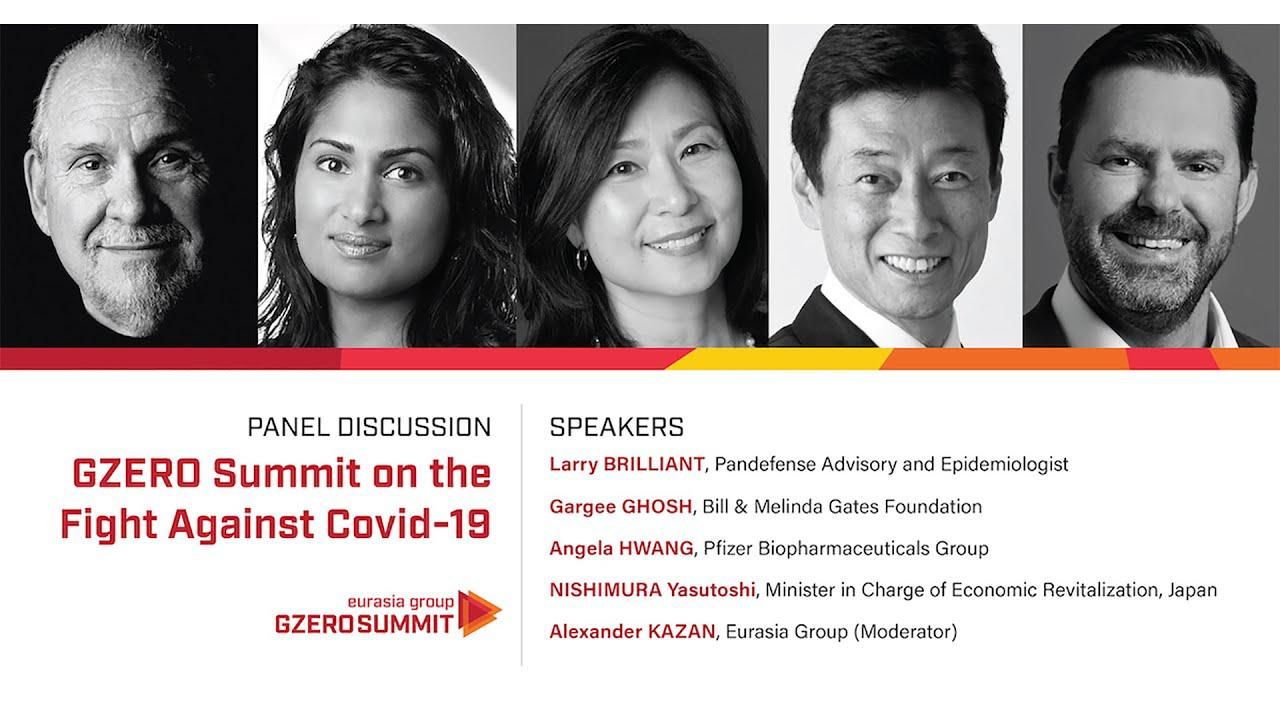December 09, 2020
Almost one year since the coronavirus upended the world, what's the current state of play on ending the pandemic, and what challenges we face towards vaccinating everyone in 2021.
Fortunately, as the virus has grown exponentially, so has science, Dr. Larry Brilliant, CEO of Pandefense and one of the world's most highly regarded epidemiologists, said during the panel discussion on fighting COVID-19 at the 2020 GZERO Summit in Japan.
Science, he explained, has accomplished the audacity of developing successful vaccines in record time. That's why he's optimistic about ending the pandemic next year in many parts of the world, even if the next 2-3 months will be very bad mainly in Western countries.
Part of the reason for his optimism is the great news about the efficacy of vaccines like the one developed by US pharmaceutical giant Pfizer and German company BioNTech, which the UK started administering to its citizens on Tuesday.
For Angela Hwang, president of Pfizer's biopharmaceuticals group, developing the vaccine is just the start. Now enough people need to get vaccinated to achieve the herd immunity necessary to stop the virus in its tracks.
To build sufficient trust in the drug to achieve that goal, she said, everyone needs to be on board. It'll take not only the private and public sectors working together but all of society committed to making everyone understand that vaccines work, and that you must get inoculated at a moment of extreme resistance in some countries.
Also, mass vaccination means it must happen across the developing world at the same level as in developing countries. The world is just too interconnected to leave anyone behind, noted Gargee Ghosh, president for global advocacy and programs at the Bill and Melinda Gates Foundation.
Even where many people are suspicious of vaccines, she added, ultimately the clear benefits of restarting economies will hopefully convince those who fear rolling up their arms.
Vaccinations likely won't be a problem in Japan, where Yasutoshi Nishimura, minister, in charge of economic revitalization, underscored how the majority of the population has heeded their advice to practice social distance, wear masks, stay at home and shut down businesses despite no mandatory orders to do so.
Watch the above video to learn more insights from our panelists.
More For You
As expected, the Supreme Court struck down the bulk of Donald Trump's sweeping “Liberation Day” tariffs as illegal … and almost nothing changed.
Most Popular
What's Good Wednesdays
What’s Good Wednesdays™, February 25, 2026
Sponsored posts
Small businesses at a crossroads
Chris, an Army veteran, started his Walmart journey over 25 years ago as an hourly associate. Today, he manages a Distribution Center and serves as a mentor, helping others navigate their own paths to success. At Walmart, associates have the opportunity to take advantage of the pathways, perks, and pay that come with the job — with or without a college degree. In fact, more than 75% of Walmart management started as hourly associates. Learn more about how over 130,000 associates were promoted into roles of greater responsibility and higher pay in FY25.
Ukraine's President Volodymyr Zelenskiy, Finland's President Alexander Stubb, Estonia’s Prime Minister, President of the European Commission Ursula von der Leyen and other European leaders visit memorial to fallen Ukrainian defenders at the Independent Square on the fourth anniversary of Russia's full-scale invasion, in Kyiv, Ukraine February 24, 2026.
Ukrainian Presidential Press Service/Handout via REUTERS
Somewhere in the Donbas region, Ukrainian soldier Artem Bondarenko says he hasn’t slept through the night in months as he defends Eastern Ukraine.
- YouTube
In the latest episode of Vladimir Putin and Xi Jinping's hit wellness podcast This Authoritarian Life, we learn how positive communication patterns can break negative cycles in our relationships -- especially our relationships with Iran, Syria, Venezuela, and Cuba. #PUPPETREGIME
© 2025 GZERO Media. All Rights Reserved | A Eurasia Group media company.
